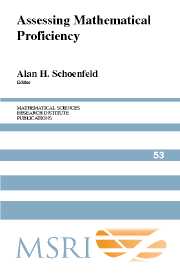Book contents
- Frontmatter
- Contents
- Preface
- Acknowledgments
- Section 1 The Big Picture
- Section 2 Perspectives on Mathematical Proficiency
- Section 3 What Does Assessment Assess? Issues and Examples
- Section 4 The Case of Algebra
- Section 5 What Do Assessments Assess? The Case of Fractions
- Section 6 The Importance of Societal Context
- Epilogue: What Do We Need to Know? Items for a Research Agenda
- About the Authors
- Subject Index
- Author Index
- Task Index
Preface
Published online by Cambridge University Press: 06 July 2010
- Frontmatter
- Contents
- Preface
- Acknowledgments
- Section 1 The Big Picture
- Section 2 Perspectives on Mathematical Proficiency
- Section 3 What Does Assessment Assess? Issues and Examples
- Section 4 The Case of Algebra
- Section 5 What Do Assessments Assess? The Case of Fractions
- Section 6 The Importance of Societal Context
- Epilogue: What Do We Need to Know? Items for a Research Agenda
- About the Authors
- Subject Index
- Author Index
- Task Index
Summary
Mathematics tests—and more broadly, assessments of students' mathematical proficiency—play an extremely powerful role in the United States and other nations. California, for example, now has a High School Exit Examination, known as CAHSEE. If a student does not pass CAHSEE, he or she will not be awarded a diploma. Instead, the four years that the student has invested in high school will be recognized with a certificate of attendance. In many states, annual examinations in mathematics and English Language Arts are used to determine whether students at any grade level will advance to the next grade.
Tests with major consequences like those just described are called high-stakes tests. Such tests raise myriad questions. What kinds of understandings do they test? Do they capture the kinds of mathematical thinking that is important? Are they equitable? Is it fair to let a child's career hinge on his or her performance on one particular kind of assessment? Do such tests reinforce and perhaps exacerbate patterns of discrimination, further penalizing students who already suffer from attending “low-performing” schools? Will they increase dropout rates, because students who see themselves as having no chance of passing a high-stakes exam decide to leave school early? Or, can such tests be levers for positive change, compelling attention to mathematics instruction and helping to raise standards?
These are complex issues, all the more so because of the multiple roles that the assessment of students' mathematical proficiency plays in the U.S. educational system, and the multiple groups that have an interest in it.
- Type
- Chapter
- Information
- Assessing Mathematical Proficiency , pp. ix - xviiiPublisher: Cambridge University PressPrint publication year: 2007



